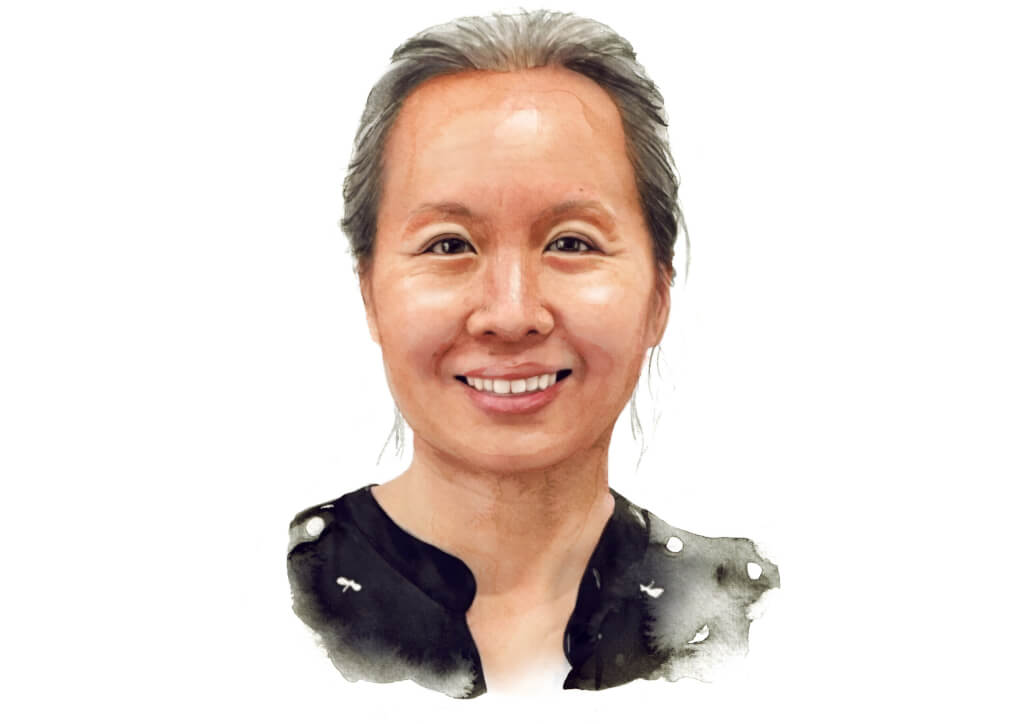
US Diplomat, International Development Practitioner, Executive Coach, Master Facilitator, Author
Yikee Adje is a Foreign Service Officer for the United States Agency for International Development (USAID). Currently, she is stationed in Kinshasa, Democratic Republic of the Congo, supporting one of USAID’s largest country portfolios of development and humanitarian assistance in Africa, inclusive of educational, health, governance, and environmental projects and resources. She also achieved her Center for Executive Coaching Certification (CEC), which positively influenced her work at USAID. It’s been an unexpected, odds-defying career for Yikee, fortified by her innate instinct, drive for good, and a touch of opposition to her parent’s advice.
Yikee is a first-generation American born to Chinese parents who escaped from China to Hong Kong during the Cultural Revolution. They settled in the San Gabriel Valley in Southern California, seeking to provide their children with a better life. From a young age, Yikee observed the contrasting standards her parents imposed on her and her brother. “There’s a difference in the value of boys and girls. I’m sure they had all kinds of high aspirations for my brother, but for me, it didn’t really matter. And so that was an interesting dynamic growing up.”
This didn’t stop Yikee from envisioning a distinguished career for herself, as she knew she wanted to contribute to society in a meaningful way. She received two bachelor’s degrees in Social Welfare and Mass Communications from the University of California, Berkeley, with ambitions to become a social worker. This led to her first job out of college, working in case management for Tarzana Treatment Centers, a behavioral and mental healthcare clinic for children and young adults. And all of this came to the disappointment of her parents, who didn’t understand her career choice and its prospects.
And yet, for Yikee, this first job was just scratching the surface of what she wanted, and what she knew she could achieve. “I had the feeling of…what else can I do? I felt like there’s more to be done.” After various stints with local non-profits, she left the 9-5 world to immerse herself in self-led volunteer work. Yikee considered a more structured program like the Peace Corps but opted to design her own experience, allowing her to focus on the causes of most significant interest and importance to her. Yikee was frugal with her money since college and built up enough savings to cover the next two years she spent traveling from country to country to do volunteer work and to teach English. She went everywhere from India to Peru, Bolivia, and Ecuador, eventually settling in China to teach English.
“That experience cemented in my mind, ‘Oh yeah, this is what I want to do – international development work.” To take this next step professionally, Yikee knew she needed additional education. Once again, this came to the dismay of her parents. “The day I decided to pursue my master’s, my dad said, ‘You’re a girl; you don’t need to get such a high degree; that’ll make it more difficult for you to find a husband. We suffered so much to come to America just to give you a good life. I just want you to live a simple life.’ I said, ‘Thanks, Dad, but I’m going.’”
At the Johns Hopkins University School of Advanced International Studies, she sought to study international development, however, her volunteer experience was not enough to qualify her to have this concentration. Yikee pivoted to International Law, still confident this would create an avenue for a development-focused career.
During graduate school, Yikee landed an internship in South Sudan with the non-profit CHF International, now known as Global Communities. There, she produced an educational radio program on gender-based violence. “Once I had that experience, my first experience in Africa, that’s it. That was the beginning.”
After graduation, she continued her career across Africa, going next to Benin as a Program Manager for the US government-funded organization Catholic Relief Services (CRS). There, she provided financial and educational services and, along the way, met her now husband, a local Beninese musician. After some time, Yikee assessed that given the country’s relative stability, she would be of greater assistance elsewhere and transferred to Darfur, a western region of Sudan, during the height of the war. Yikee held various responsibilities, from safety to administration, logistics, procurement, and HR, a perplexingly high level of agency for younger staff. “So you’re out there, the one responsible for getting the results; it’s your blood, sweat, and tears. There was a looming threat of kidnapping, so we always had to make the call, ‘Do we let staff travel to visit their projects or not? And we’d go to all the security meetings with the United Nations; we were right in the midst of it.”
After a while, Yikee reached her limit in what she could withstand in the role and returned to Benin to get married and slow down her career. With the arrival of her first child soon after that, Yikee departed CRS and was hired as a local resident contractor at USAID, which enabled her and her family to remain rooted in Benin. USAID provides funding to organizations like CRS which are implementing partners of the US government. “It was a great move over; I’m a bit further away from the work, it’s more bureaucratic, and you’re more in the office. And that was okay for me.”
After several years in this role, Yikee took the leap and applied to become a diplomat, which required her to return to the US to complete training as a Program Officer. “Having been abroad for so long, when I return to the US, it already feels foreign…there’s always new technology…the world changes dramatically.” The training entailed rotations at different USAID offices in the US to learn the essentials of the role of a diplomat, during which Yikee was eager to get through and make her return to the African continent.
As a diplomat, Yikee went to work in Senegal at the Sahel Regional Office, where she led on project design, coordination, and monitoring and evaluation. Yikee has been content with the less exciting administrative work, as she appreciates its purpose in the wider mission. “The bureaucracy can be very stifling for people without field experience. When people finish grad school and go straight into working for the US government, they often feel the need to be out there and see the work and beneficiaries and all the endless paperwork that’s keeping them from doing that can be frustrating. Since I have field experience, I’ve gotten my fill, and I’m good. I’m a happy government bureaucrat at this point, doing my best while at work and allowing space for the other parts of my life that I find joy and value in. What I’m most proud of in my life now is my family and in particular, my five kids.” Goodness gracious, five kids is quite the accomplishment. And finding time to be the one to cook for them on top of that is exceptional.
Yikee’s career trajectory in government has undoubtedly been atypical. From the start, she set boundaries with the work and made professional decisions in the best interest of her family. With this, she accepted she would rise slowly. And yet, it’s been a rapid and surprising ascent. “I felt my promotions were all from God’s hand because I have been reluctant to move up too quickly given my family responsibilities yet God keeps the opportunities coming.” She also credits her superpower for multitasking, a particular talent developed as a mother of five. Yikee shares her advice on work-life balance in her book called DIPLOMATICALLY: A Guide for Creating Work-Life Balance in the Foreign Service. She shares her 3Cs – Connection, Communication, and Courage. Yikee teaches readers how to make deeper connections, communicate effectively, and show up intentionally at work so they can achieve work-life balance while advancing their careers.
Balance has also been found by heeding some of the more helpful and less pointed advice from her father: “It doesn’t matter if you have many degrees…the most important thing is to know how to get along with people. You will get far if you know how to do that.” This Yikee believes wholeheartedly. She recognizes the strength of her relationships with her colleagues is intrinsically linked to the quality of the work. “My job is 90%- 95% soft skills. I love that space. As a program officer, I coordinate everything happening at the mission. For example, I ask my technical colleagues to report their development results, so as a mission, we can report it to Congress to let Congress know what USAID did with the foreign assistance funding they gave us.”
Foreign Service Officers must change posts every two to four years, so after Senegal, Yikee transferred to the Democratic Republic of the Congo. A posting in the DRC is often harder to fill, so Yikee accepted an extension to four years, with a bonus, to provide a period of continuity for her growing family. With every new post, her husband also takes up any job the Embassy can provide, while doing his music on the side. “My personal goal is to be able to maintain my work-life balance stance, and continue rising to the top and be someone that’s able to be in a senior position and still have my family intact and thriving.”
And so does Yikee rise, serving in the role of Office Director. Here she’ll be able to apply her executive coaching training knowledge to enhance her effectiveness as a leader. She has been coaching internally her USAID colleagues and facilitating strategic workshops and retreats. Yikee’s career advice is simple: “It’s so cheesy, but you can do whatever you want. You just have to keep taking steps toward it. I had to be a case manager/social worker first to know that ‘Okay, maybe that’s not right for me’ and then keep moving on, keep trying. I could have never predicted this career…But I feel like this is what I am meant to do.” To learn more about Yikee go to Amazon and check out her book DIPLOMATICALLY: A Guide for Creating Work-Life Balance in the Foreign Service and visit her website to read more of her writings at www.adjesolutions.com.
